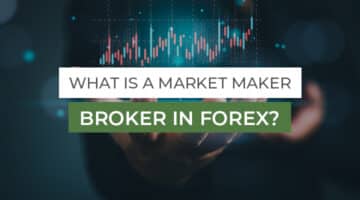Different Types of Traders in Forex

In this article
Game theory is amazing because there is often more than one way to reach the goal. So finding the easiest way to do it is all that matters.
If you watch a tennis match, you may notice that different players have different styles. However, they all have a similar goal, regardless of their size, agility, strength, or other attributes. So keep on playing good points.
In trading, you must focus on finding one good trade after another, regardless of the many approaches available.
This article will learn about the most common forex traders and decide what approach is best for you.
Forex trading – What is it?
In forex trading, currencies are exchanged. Trading is purely speculative while exchanging is often practised for practical reasons.
By buying a currency, you anticipate gaining value compared to another currency. The reasons for this can vary, such as changes in monetary policy or changes in total employment. Seasonal variations are also possible.
Currency appreciation may be observed in high season for countries whose economies depend on tourism.
Forex accounts for over $6 trillion in daily transactions in today’s economy. Following the US dollar’s breakup with gold in the 1970s, currencies fluctuated, and the forex market boomed. However, it took until the 1990s for the retail forex market to catch up with the development of information technology.
Forex trading is open to who?
Nonprofessional forex traders usually do not trade for profit. Most of them are tourists who exchange their currency while abroad. Nevertheless, these transactions should not be considered speculative but necessary, and the high spreads make profiting difficult.
Despite adults being able to trade forex, less than 6% of the market is occupied by retail forex traders ($360 billion daily volume). Since institutions are often both buyers and sellers in forex trading, forex trading remains a game dominated by institutions.
What types of traders are there in forex?
Trading goes by many names and designations in the grand scheme of things. However, taking into account time, traders and strategies fall into three major categories: day traders, swing traders, and position traders.
1. The Day Trader
The day trader seems to be the most appealing among the three designations. As the name implies, day traders trade for the day. Therefore, the market participants will usually avoid holding anything after the session closes and trade in high volumes.
On a typical day, the short-term trader will generally try to turn over 10 to 100 times more money than usual on one or more deals. The trader can profit from a relatively small swing by doing this.
Then, traders who work in proprietary shops will usually use shorter time frames, such as 1 minute, 5 minutes, or 15 minutes. Day traders also rely heavily on technical analysis and volatile trading pairs to profit.
They are also looking for opportunities in the short term, even if a long-term fundamental bias is helpful.
2. Swing Trader
The swing trader can use a longer timeframe and sometimes hold his position for a few hours – or even a few days – to call a market turn. A swing trader hopes to benefit from a change in direction to increase their position, unlike a day trader. To a swing trader, timing is more important than for a day trader.
Both traders, however, prefer technical analysis over fundamental analysis. As a result, swing trading will likely occur in a currency pair with greater liquidity, like the British pound/US dollar.
3. The Position Trader
As the position trader usually has the longest time frame of the three, their market perspective differs. They tend to look at longer-term plans rather than short-term market movements like the day and swing styles.
Position strategies can last from days to months to years. Because of this, traders will observe technical formations but commit to more long-term fundamental opportunities and models.
The FX portfolio managers analyse and consider economic models, government decisions, and interest rates when deciding what to trade. Position trades can be placed in any of the major currencies considered to be liquid.
The list includes many of the currencies of the G7, as well as the favourite currencies of emerging markets.
4. Scalper
Short-term traders are known as scalpers, and they focus on holding positions for short periods, from seconds to minutes. For example, in forex scalping strategies, small gains are targeted at the busiest times (most liquid times) during the day.
The life of a scalper is fast-paced. Due to the constant flow of new information and rapid market change, it is essential to be observant, instinctive, quick-witted, and stoic under pressure.
5. Algorithmic Trader
A computer program places trades for algorithmic traders at the best price. Traders can code the programs themselves or purchase existing products using defined instructions or high-frequency trading algorithms.
Forex traders who use technology and want to apply it in their careers are well suited to this type of trading. However, technical charts are also well-known to algorithmic traders, as their programs are designed to analyse them.
6. Event-driven Trader
Traders influenced by events rely on fundamental analysis over technical charts to make decisions. To accomplish this, they will try to take advantage of spikes in economic or political data, such as Non-Farm Payroll, GDP, and employment numbers.
People who like to keep up with world news will find this type of trading appealing to understand how events affect markets.
With a keen sense of curiosity and a knack for predicting how global and localised events will unfold, you’ll be adept at processing new information.
Reasons to choose forex trading as a future career
Foreign exchange trading, also known as forex trading, offers several advantages. Among them are:
1. Low cost
Brokerage and commissions for forex trading can be very low. Realistically, forex brokers do not charge commissions-they make money from the spreads between currencies. Therefore, there are no brokerage charges to worry about, thus eliminating overhead costs.
They compared that to equity or other securities trading, where brokerage structures differ greatly, and traders must consider such fees.
2. Traders can benefit from volatility
Currency price swings are frequent among the major currencies. High volatility can offer enormous opportunities for profits if trades are placed wisely.
3. Various pairs to trade
Eight major currencies are involved in 28 major currency pairs. Timing, volatility patterns, and economic developments can be considered factors in choosing a pair.
Forex traders who love volatility can easily switch between different currency pairs.
4. Low capital requirements
Forex trading is easy to start, thanks to tight spreads in terms of pips. However, investing in other markets (such as equity, futures, and options) may not be feasible without more capital.
A margin trading account with a large leverage factor (up to 50-to-1) is the icing on the cake for forex traders. Despite the risks associated with such high margins, it is easier to gain greater profits with less capital.
5. Accessibility
There are hundreds of technical forex indicators at their disposal for short-term forex traders. In addition, there are several fundamental analysis theories and tools for long-term traders, providing a wide range of tools and theories to help new forex traders succeed.
6. It suits a range of trading styles.
Forex markets operate from morning to night, allowing traders to trade at their convenience. This is beneficial to short-term traders who usually take positions over short periods (say a few minutes to a few hours). Almost no one trades during off-hours.
US Eastern time is Australia’s daytime; US Eastern time is Australia’s nighttime. Traders in the US may choose to trade the AUD during US business hours since little changes are expected, and the price range for AUD is stable.
They use high-volume, low-profit trading strategies since they do not understand the forex market well, so they have little profit margins. However, they trade at high volume to profit to compensate for the low volatility.
There are also long-term trades, which can last from a few days up to several weeks. This is a great advantage of forex trading.
7. High liquidity
Regarding the notional value of daily trading, the forex market is the biggest financial market. As a result of this, large orders of currency trades can be efficiently filled even with high levels of liquidity.
As a result, pricing becomes more efficient due to eliminating price manipulation and anomalies.
What are the disadvantages of a forex trading career?
A career in forex trading has several advantages, but it also has disadvantages.
1. Transparency is lacking
Since the forex market is deregulated and dominated by brokers, traders are against professionals. Moreover, since the forex market is broker-driven, it may not be as transparent as possible.
Trading quotes provided by the broker may be limited, and the trader may not have any control over how his order is fulfilled. Dealing only with brokers regulated by broker regulators would be an easy solution.
Although the market is not under regulatory control, broker activities are.
2. Process for determining the price is complex
Multiple factors influence foreign exchange rates, primarily global politics and economics, which can be difficult to analyse and draw reliable conclusions.
Technical indicators account for most forex trading, so forex markets are so volatile. Therefore, trading incorrectly with technical indicators will result in losses.
3. High leverage, high risk
Leverage can benefit a trader, but it can also magnify their losses. With Forex trading, one can gain exposure to profit/loss multiple times their trading capital due to its high leverage. For example, with the leverage of 50:1, a position worth $50 can be taken with only $1.
It is easy for forex trading to turn into a loss-making nightmare unless one knows the basics of leverage, has a good capital allocation scheme, and can control their emotions (for example, being willing to cut losses short).
4. Self-directed education
Portfolio managers, trade advisors, and relationship managers can assist traders in the stock market. For forex traders, there is no assistance. Throughout a career in trading, self-directed learning must be disciplined and continuous.
Beginners often quit during the first phase of trading, usually due to losses incurred due to limited knowledge about forex trading and inefficient methods.
Related questions: FAQs
1. Is forex trading a good way to get rich?
Currency trading can make you wealthy if you have deep pockets or are an exceptionally skilled currency trader. But forex trading can be a rocky road to enormous losses and potential poverty for the average retail trader rather than an easy way to riches.
2. What does a forex trader do?
A forex trader buys and sells currencies on the foreign exchange market. They aim to profit from fluctuations in the value of different currencies relative to one another. Despite being highly profitable, forex trading entails a high risk of loss.
3. Is it possible for me to become a forex trader?
You may be a successful forex trader if you have consistently traded forex independently. However, hedge funds and mutual funds in forex trading need professional traders and account managers to buy and sell decisions.
4. Is trading forex a skill?
The key to becoming a successful forex trader is to hone your trading skills before achieving this goal. To do so, you must practice regularly and be disciplined. Trades should also be analysed carefully.
5. How long does it take to learn forex?
Typically, learning to trade forex will take around a year. Technically, risk management and psychology can be learned within a few weeks, but it takes around a year to learn them. The majority of traders quit before they learn to trade consistently.
Bottom line
There is no need for your forex trading style to be static; it may change over time. Alternatively, you may be a scalper stressed by short-term price movement and looking for the financial freedom that comes with position trading.
Another possibility is that you are a swing trader who wants to study an event-driven approach’s fundamentals.
If you want to grow as an investor and test your skills on the market in new ways, no matter your style or goals, you can always do that. The forex market has many types of traders, and each one requires a different approach.
Your chances of success will be maximised if you select the perfect style for you, whether you prefer a fast-paced sprint or a lengthy marathon.
Jason Morgan is an experienced forex analyst and writer with a deep understanding of the financial markets. With over 13+ years of industry experience, he has honed his skills in analyzing and forecasting currency movements, providing valuable insights to traders and investors.
Forex Content Writer | Market Analyst
Relevant Posts
eToro vs AvaTrade
[top_three_brokers] Overview AvaTrade is an online trading platform established in 2006. On the other hand,…
Read more

What is Scalping in Forex?
[top_three_brokers] Do you know what scalping trading in Forex is? In the forex market, scalping…
Read more

BDSwiss Minimum Deposit
[top_three_brokers] Are you interested in finding out what BDSwiss minimum deposit is? To trade with…
Read more

What is a Market Maker Broker in Forex?
[top_three_brokers] You must learn what is a market maker broker in forex is all about…
Read more
Is Forex Trading Haram?
[top_three_brokers] Is forex trading haram or halal? Forex trading is yet both halal and haram, depending on…
Read more
FX Daily
[top_three_brokers] Have you ever been interested in the world of Forex but had no idea…
Read more

RoboForex MT4 – MetaTrader 4
[top_three_brokers] [single_affiliate title="" id="3990" size="big"] To have an everlasting trading experience on RoboForex, making your…
Read more
IC Markets Bonus Promotion
[top_three_brokers] [single_affiliate title="" id="3974" size="big"] If you are ready to open your live trading with…
Read more

What is Volatility 75
[top_three_brokers] Volatility indexes, or VIX, are common examples of barometers that gauge market sentiments. The…
Read more

Exness Demo Account
[top_three_brokers] [single_affiliate title="" id="3178" size="big"] Many of you have heard about how helpful the Exness…
Read more
eToro vs AvaTrade
[top_three_brokers] Overview AvaTrade is an online trading platform established in 2006. On the other hand,…

What is Scalping in Forex?
[top_three_brokers] Do you know what scalping trading in Forex is? In the forex market, scalping…

BDSwiss Minimum Deposit
[top_three_brokers] Are you interested in finding out what BDSwiss minimum deposit is? To trade with…

What is a Market Maker Broker in Forex?
[top_three_brokers] You must learn what is a market maker broker in forex is all about…
Is Forex Trading Haram?
[top_three_brokers] Is forex trading haram or halal? Forex trading is yet both halal and haram, depending on…
FX Daily
[top_three_brokers] Have you ever been interested in the world of Forex but had no idea…

RoboForex MT4 – MetaTrader 4
[top_three_brokers] [single_affiliate title="" id="3990" size="big"] To have an everlasting trading experience on RoboForex, making your…
IC Markets Bonus Promotion
[top_three_brokers] [single_affiliate title="" id="3974" size="big"] If you are ready to open your live trading with…

What is Volatility 75
[top_three_brokers] Volatility indexes, or VIX, are common examples of barometers that gauge market sentiments. The…

Exness Demo Account
[top_three_brokers] [single_affiliate title="" id="3178" size="big"] Many of you have heard about how helpful the Exness…



